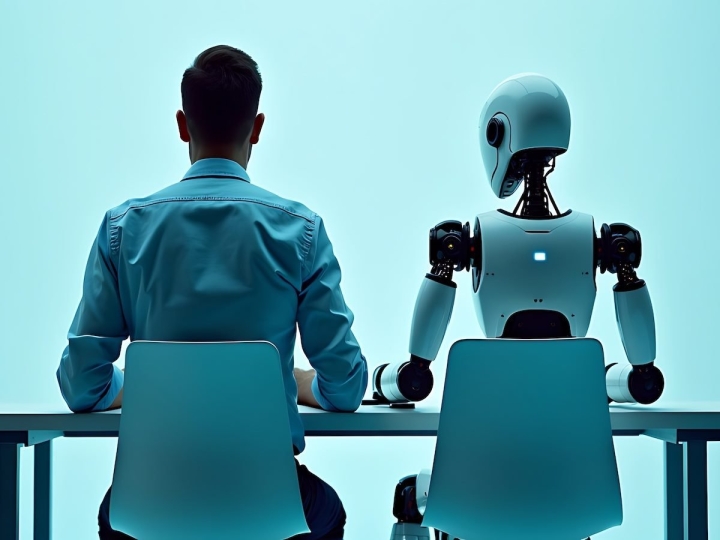
EditorialAI in Employee Experience: The Quiet Revolution Reshaping the Workplace
As boardrooms obsess over customer-facing AI and automation’s impact on operations, the real transformation is happening behind the scenes, quietly, within the employee experience.
AI is no longer limited to backend HR software or predictive hiring tools. It’s now embedded across every touchpoint of the modern workplace. From how people get paid, to how they grow, how they’re supported and even how they leave. And the ripple effect is redefining what it means to feel seen, supported and motivated at work.
The Human Side of AI Starts With Pay
Pay transparency is the political third rail in corporate life. But today, AI is neutralizing that voltage.
According to a 2025 Korn Ferry survey, 22% of companies already use AI to benchmark salaries, with another 63% considering it. Platforms like Payscale’s Verse and Peer are leading the charge, using real-time employer-reported data and proprietary AI models to surface compensation gaps and out-of-date pay bands in real time.
These tools aren’t just for HR analytics. They're boosting employee trust. When a company can confidently back its compensation decisions with data and transparency, employees take notice. Especially in a climate where pay equity across race, gender and age is no longer a DEI side quest, it’s a business imperative.
The rise of AI in pay is really about removing opacity, Ruth Thomas, chief compensation strategist at Payscale, said in an interview with Business Insider. "The onus is on the employer to make sure that they are aware of any potential bias in the vendor solutions."
This shift is already paying off. Employees who perceive their pay as fair are more likely to stay, perform and advocate for their workplace. AI, in this case, becomes not just a tool, but a cultural equalizer.
Agentic AI Is Rewriting the Employee Relationship
The term “AI assistant” is quickly becoming outdated. Employees have agentic AI, software that doesn’t just respond to requests, but proactively executes tasks, anticipates needs and flags human issues before they spiral.
Lattice, a leading HR platform, recently began integrating AI agents that attend meetings, monitor employee sentiment and even coach managers on having difficult conversations. These aren’t bots trying to replace workers. They’re support systems enabling better human leadership. It’s a radical reframing: AI not as a compliance mechanism, but as an empathetic amplifier.
And it’s working. According to Deloitte, 69% of tech leaders now say generative AI is prompting them to hire more, not less. These AI tools aren't shrinking workforces; they're unlocking entirely new hybrid roles that combine digital fluency with human insight.
Wellness and Burnout Prevention Go Predictive
We’re also seeing AI-driven wellness tools evolve from reactive to predictive. Platforms like ZoomShift and WorkTango are piloting sentiment analysis across Slack, email and performance check-ins to detect early signs of burnout, disengagement or toxic culture.
One 2024 study reported a 22% increase in successful stress intervention outcomes when AI was used to trigger early outreach to struggling employees. Instead of waiting for the annual review or exit interview, companies are stepping in to coach employees much quicker.
For employees, this isn’t surveillance — it’s support. When done transparently, AI can act as a safeguard against the chronic stressors of modern work life.
The Rise of Dynamic Learning & Mobility
Perhaps the most future-forward impact of AI in employee experience is how it’s reshaping internal mobility and career development.
Instead of traditional static learning paths, AI now enables personalized upskilling. Platforms like Workday and Eightfold are mapping individual strengths against company needs, identifying skill gaps and nudging employees toward growth opportunities, often before they even realize they’re ready.
Internal mobility becomes less about job postings and more about data-driven matches. Employees are no longer waiting to be tapped for the next role, they’re being discovered.
This Is the Future of Employee Experience
AI in employee experience isn’t about automation for automation’s sake. It’s about using intelligence to remove the friction, frustration and bias that quietly erode engagement.
For companies willing to embrace AI thoughtfully, the payoff is clear: better retention, higher productivity and a workplace where employees feel valued in real-time, not just on paper.
AI is not just transforming how we work. It’s transforming how we feel about work. And in a market where talent is the only sustainable advantage, how people feel matters more than ever.